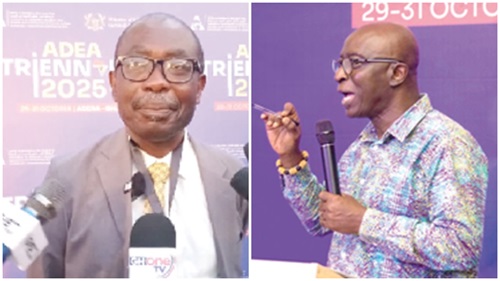
2 Educationists back local language use in lower primary
Two educationists have backed the directive by the Education Minister, Haruna Iddrisu, that instructs all basic schools to fully implement the policy of using Ghanaian languages as the medium of instruction from kindergarten to lower primary.
They argued that children who learnt in their local language developed a deeper understanding of concepts, refuting the notion that using a mother tongue in early education would 'corrode' or 'erode' a child's ability to use English effectively.
Educationists
The two are the Director-General of the Ghana Education Service (GES), Professor Ernest Kofi Davis, and a Professor of International Education and Development from the Open University, UK, Professor Kwame Akyeampong.
They shared their perspective on the topic after participating in a discussion on “Foundational Learning Initiative” at the 2025 Triennale on Education and Training of the Association for the Development of Education in Africa (ADEA) at the Labadi Beach Hotel in Accra.
Implementation
Speaking on the topic, Prof. Davis confirmed that the GES was set to implement a policy that promoted the use of local languages in education, particularly in the early stages of a child's education.
He explained that the policy had been there and aimed to give students who did not have access to the school context due to language difficulties an opportunity to learn and build their language proficiency in English.
Prof. Davis stressed the fact that language was a critical tool for learning and that schoolchildren who were not proficient in the language of instruction might struggle to access the curriculum.
He explained that the policy proposed that local languages be used as the medium of instruction from Kindergarten to Grade Three to allow the pupils to build a strong foundation in reading and mathematics.
“This approach is expected to improve learning outcomes and reduce the number of students who struggle to comprehend concepts due to language difficulties.
“The policy is not about using multiple languages simultaneously but about using the local language as a medium of instruction at the lower primary level,” he told journalists, adding that even after the lower primary level, local languages could still be used as an additional resource to support pupils who might be struggling with English.
Global evidence
For his part, Prof. Akyeampong emphasised the need to differentiate between the global evidence supporting mother tongue education and its practical implementation challenges.
He said the global evidence clearly showed children who learnt in their local language develop a deeper understanding of concepts.
This strong foundation then enables them to transition more effectively into learning English.
“This approach is an advantage, not a disadvantage, for a child's overall learning progression.
Prof. Akyeampong, who also chairs the Global Education Evidence Advisory Panel, confirmed that the evidence was incontrovertible, adding, “using a mother tongue or local language significantly improves a child's ability to transition into learning other languages like English or French.”
He highlighted that starting early in English was not necessarily an advantage, contrary to common fears, as strong foundational learning in the native language proved more beneficial.
“While the policy supporting mother tongue instruction is sound, its implementation in Ghana faces challenges due to the country's linguistic diversity,” Prof Akyeampong stressed.
He said children were often multilingual, and the goal was to use languages they understood at early stages, especially in rural areas where English familiarity was low.
